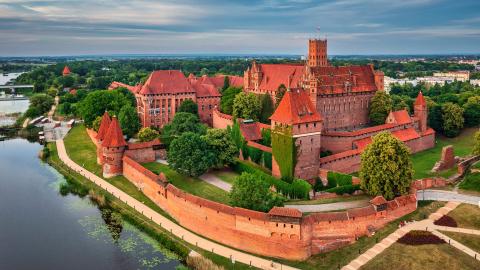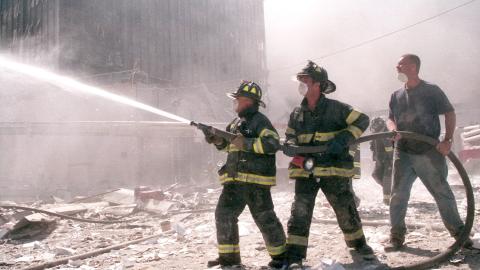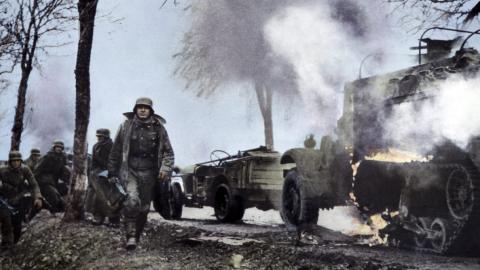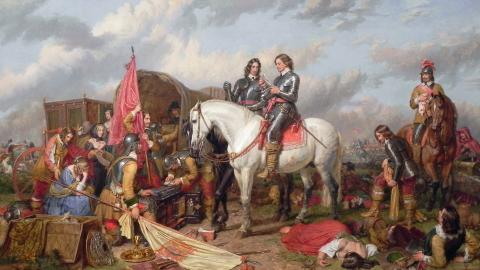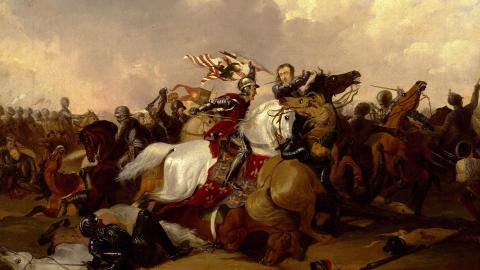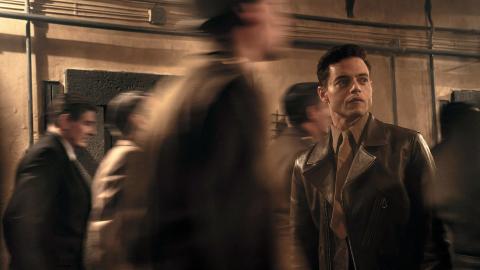The human cost of the RAF’s bomber war during World War II was staggering: Of the 125,000 men who served in Bomber Command, over 55,000 were killed and another 8,400 wounded. Some 10,000 survived being shot down, only to become prisoners of war. In simple, brutal terms, bomber aircrew had only a 40 per cent chance of surviving the war unscathed.
World War II's most famous and successful RAF heavy bomber, was the Lancaster and out of the 7,377 built, more than half were lost to enemy action or training accidents. Only one in twenty Lancasters completed over one hundred wartime missions. By 1943, only one in forty airmen were expected to survive through a second tour that consisted of thirty operations, giving them a worse survival rate than the men in the trenches in the First World War.
With such odds stacked against them, the bravery of these young men - mostly in their early 20s - is remarkable. Lancaster: The Forging of a Very British Legend, the new book by ex-RAF navigator and best-selling author, John Nichol sets out to tell these stories of remarkable sacrifice, using first-hand accounts of some of the remaining Lancaster crew. The book is a profoundly moving tribute to the Lancaster bomber, its heroic crews and the men and women who kept her airborne during the country's greatest hour of need.
Sky HISTORY spoke to John Nichol about his new book and about whether the Lancaster truly was, ‘the greatest single factor in winning the war against Germany’, as was claimed by Sir Arthur Harris, the no-nonsense chief of Bomber Command.
What inspired you to write about the Lancaster bomber?
Two years ago, I wrote Spitfire, telling the story of the fighter through the eyes of the men and the women who flew it, built it, designed it and tested it. And it was a great success but what came out of it from a personal level was the realisation that history is dying before our eyes.
I was in contact with forty or fifty Spitfire veterans and I think by the time the book was published, two were alive. Now only one of those veterans is still alive. And so, for Lancaster, what I was trying to do was record the history of the aircraft, through the eyes of the veterans who flew it whilst they could still tell their story. After all, if we don't recall these stories now when will we do it?
I wanted to put their stories on paper to commemorate their incredible sacrifice and to give the reader a much better idea of what incredible courage they had, and how they contributed to the war.
Do you agree with Sir Arthur Harris that the Lancaster bomber was the ‘greatest single factor in winning the war’ ?
They are Sir Arthur Harris’s words but he wrote them in the aftermath of the war when he was writing to the company that actually built the Lancaster. I have two points on that.
I am always very wary about seeing this battle, or this weapon or this aircraft as being crucial to winning the war because WW2 was a five and a half year campaign: every battle and every campaign contributed. I would never put the efforts of the Bomber Commander above Fighter Command or the efforts of the Merchant Navy and the convoys above the D-Day veterans. But what Lancaster did and what Bomber Command did as an overall force was something that almost no other military formation could possibly claim. And that is to take the fight to Germany, every single day of the war. From the very first day to the very last day of WW2, the bombers were flying.
What made the Lancaster stand out from other British bombers of the era?
Obviously, it's capacity to carry bombs, it was almost a flying bomb bay. It could carry incredible bomb-loads and take the war into the heart of Germany, day after day after day.
Also, the Lancaster was produced in such great numbers which contributed to its immense importance, as part of bomber command. The numbers built were incredible, 7,377 rolled off the production lines during the five years of its manufacture.
The payload was astonishing. Look at the two giant weapons it carried, the Tallboy bomb - dropped on the German Battleship the Tirpitz and on the V1 and V2 weapon sites - and the Grand Slam bomb, which was 22,000 pounds and the biggest conventional weapon ever built.
The Grand Slam was so huge and so heavy that when it fell it fell nose first and could penetrate ten feet of reinforced concrete. It would bury itself so far into the earth that when it exploded it would create almost an earthquake that could bring down bridges and other large structures.
So instead of having to area bombing a target, a factory or an industrial complex, and dropping a huge amount of bombs and laying waste to large areas, you drop one 22,000, pounds bomb and knock it out in one.
How did the Lancaster compare to German bombers?
After the Blitz, we didn't have that many German attacks on the UK from German bombers. It's difficult to compare one bomber to another it's more about it's about the destructive capability of the military as a whole.
War is a terrible evil but it’s a great developer for military and destructive technology. While Britain was launching bomber raids, Germany was building and developing their V1 Doodlebug, the V2 rockets and the V3 super guns that would cause huge devastation to large parts of London, and the Southeast of England and Europe in the in the dying months of the war.
Bomber Command was awarded more Victoria Crosses than any other group in the RAF during WW2. Why do you think that was?
The thing that you have to remember is that during the bomber war, the men were at war an almost daily basis or on daily operations. Most of them did one tour a month or perhaps two tours but occasionally some people went on to do two, three or four tours a month flying, that's maybe one hundred operations though that was very rare.
'The plane is at 20,000 ft he's clambering along the wing of his aircraft.'
They were putting their lives on the line every single day which, which is not the case in other branches of the military. Every time the Lancaster went out with those seven men on board they were facing incredible danger and that brought about some incredible feats of heroism and courage,
One of the Victoria Cross winners that I talked about in the book was Sergeant Norman Jackson. He climbed out onto the wing of his aircraft to extinguish a fire after he had been attacked by a fighter. The plane is at 20,000 ft he's clambering along the wing of his aircraft towards the fire and then the aircraft is attacked again. And then he's actually blasted off the wing and very badly burned. What an astonishing story of courage.
There’s a line in the book where it says in a Lancaster crew of seven, death was the eighth passenger
Throughout the war, out of 125,000 who men served in bomber command 55,000 of those were killed So that's a death rate of about 42% or 43% which is near half. Now can you imagine any government saying, we expect to lose half of our military force? It would bring a government down.
Moreover, another 8,500 were wounded and 10,000 shot down or taken prisoner of war. So, in basic brutal terms if you were serving in Bomber Command you had about a 40% chance of seeing the war through unscathed.
In the book, you speak to Lancaster veteran, Ron Needles. Can you tell us about the lives of men like Ron?
Ron joined up in 1943 or 1944 when he was 18. He was a teenager when the war started and he was working in a butcher shop. And like so many men who joined later in the war, he did so because he felt it was his duty. If they didn't join up - and weren't part of this incredible war effort - they were letting the country down.
On joining up he went through initial training to learn all those basic things you need to know about being in the army: how to put on a uniform, the basics of military discipline and military life and society.
He then went home to do training as a gunner and then went on to meet up with his crew. Of course, when these seven young men came together to form themselves from recruits they had no idea who the other person was. You had no idea what their capabilities were. A gunner had no idea if the pilot was any good; the pilots had no idea of the navigator was any good. They simply knew that they had passed the course and were qualified.
Within a few short months of coming together, they'd be out operations over hostile Europe, whether that was, Germany, or occupied France, Belgium or Holland.
That life could be brutal and short, many of them were lost.
These were young kids so many of them who were perhaps twenty-one, some of the gunners because they were joined a bit later could be nineteen or twenty years old. They were basically teenagers, many of them went to war never having had a girlfriend or having formative experiences many of us have had at that age. Many were naive young men doing their duty. And that life could be brutal and short, many of them were lost.
Within a few days of going on operations, the lucky one survived, but many of them were lost. So it was a harsh life in some way. But almost exclusively out of everyone who I spoke to, talked with love and affection about being part of the Lancaster crew.
Lancaster: The Forging of a Very British legend is available to buy in all good book shops.


